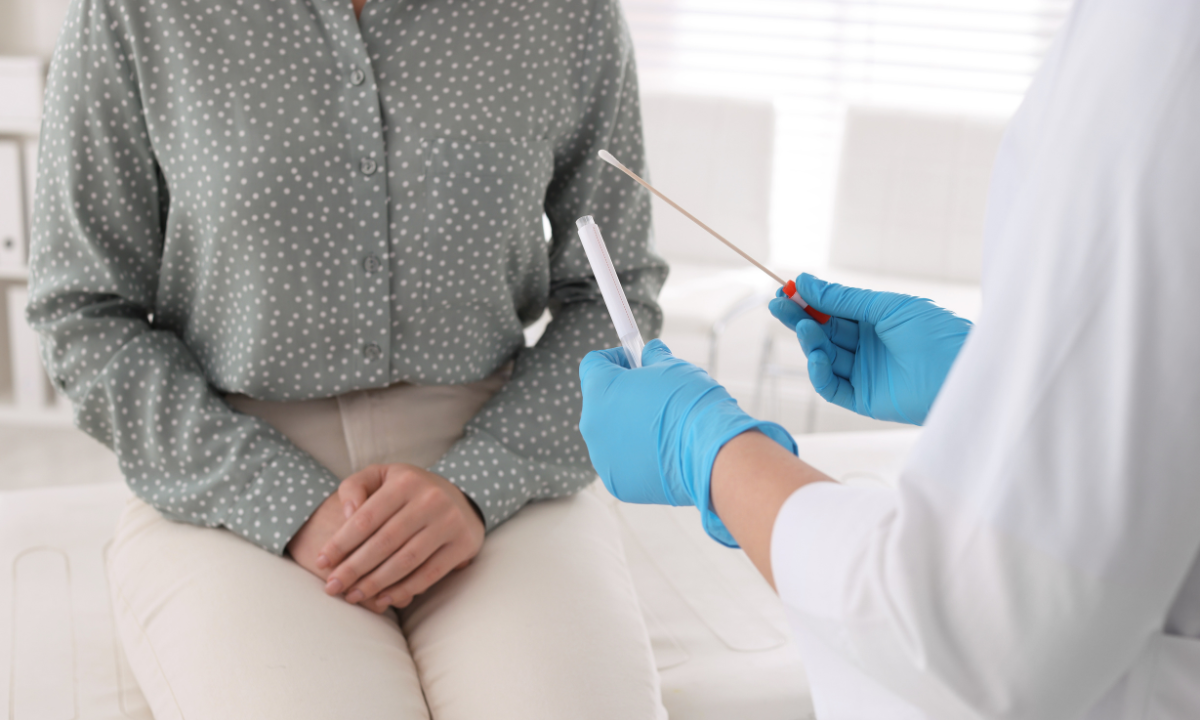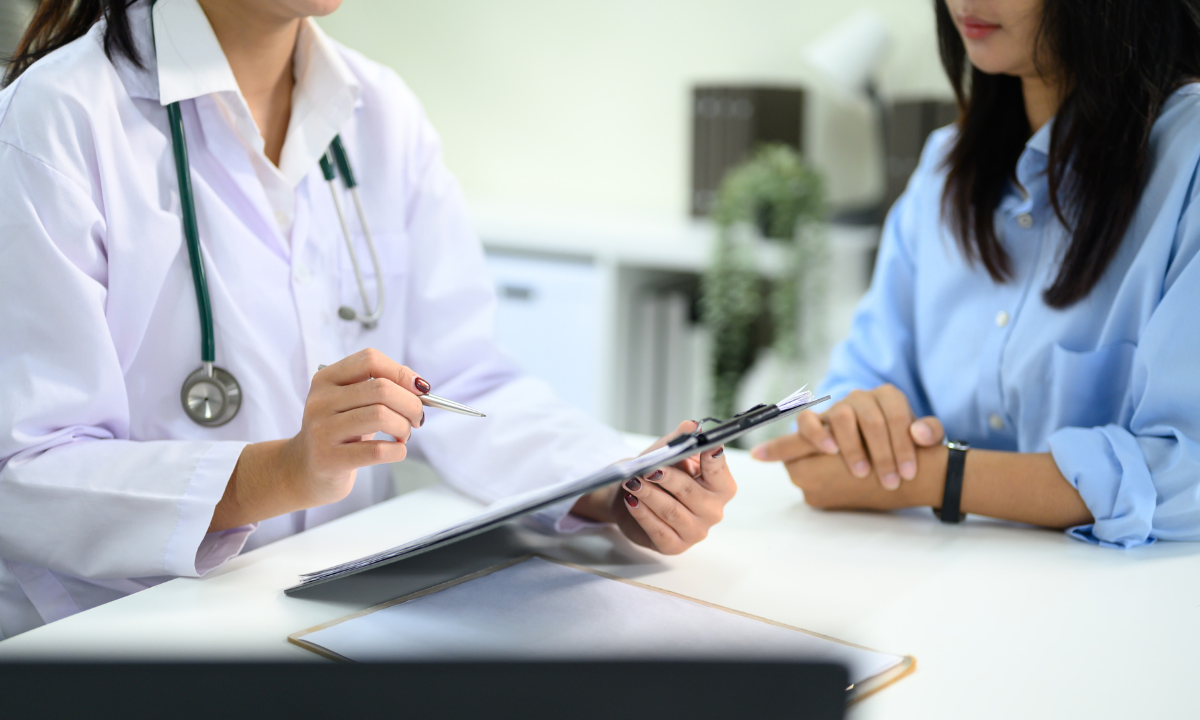Trichomoniasis, or trich, is a common sexually transmitted infection (STI) caused by a parasite called Trichomonas vaginalis. It’s usually spread through unprotected sexual contact, including vaginal or genital-to-genital intercourse.
This STI often has no noticeable symptoms, so many people may not realise they are carrying it. If untreated, trich can lead to serious complications such as fertility issues or an increased risk of HIV. Understanding the trichomoniasis test and what to expect can help protect your sexual health and your loved ones.
What is a trichomoniasis test?
A trichomoniasis test checks for the Trichomonas vaginalis parasite in your urine or genital fluid. There are a few types of tests your doctor might use:
Nucleic acid amplification test (NAAT):
A precise test that detects the parasite's genetic material, such as its DNA or RNA.
Rapid antigen test:
This test detects proteins or molecules (antigens) from the parasite that trigger your immune system.
Microscopy test:
A quick test that involves looking at a sample of fluid under a microscope to spot the parasite.
Since trichomoniasis can make it easier to catch or pass on other STIs, you might also be asked to undergo additional testing, including STI screening.
What is the trichomoniasis test used for?

Doctors test for trichomoniasis for a few reasons:
To diagnose the infection in people who have symptoms such as:
Vaginal discharge that’s clear, white, yellow, or greenish with a strong odour
Pain from sexual activity or while urinating
To screen people at higher risk, for example, those with multiple partners or a history of STIs
To check that treatment worked, since it’s easy to get reinfected if partners aren’t treated too
To identify resistant strains that don’t respond to standard medication in some cases
If you notice any of these symptoms or think you might be at risk, it’s best to get tested early. Schedule an appointment with Thomson Medical today to get checked and receive the appropriate care based on your medical conditions.
What happens during a trichomoniasis test?
Your doctor will start by asking about your symptoms and checking for signs of infection. Then, they’ll take a small sample for testing.
For women:
A vaginal swab or urine sample
For men:
A urine sample or a swab of the urethra – the tube that carries urine out of the body
The procedure is quick and safe. You may experience mild discomfort during sample collection, but it is generally not painful.
At-home testing is also available by using an at-home trichomoniasis kit. You’ll collect a urine or vaginal swab sample and send it to a lab. Make sure to follow the instructions carefully and talk to your doctor about your results, as you might need additional STI testing.
Our sexual health specialists
Loading...
Will I need to do anything to prepare for the trichomoniasis test?
You don't need to do much preparation, but there are a few small steps that you can take to help make your results more accurate:
Avoid having sexual intercourse or using vaginal creams, sprays, or douches (washing your vagina) before the test.
Try not to urinate for at least an hour beforehand if you’re giving a urine sample.
Let your doctor know about any medications or supplements you’re taking.
These simple preparations help your healthcare provider get the most accurate reading of your trichomoniasis test.
What do the results of the trichomoniasis test mean?

A trichomonas test examines a sample of your body fluid under a microscope to detect the Trichomonas vaginalis parasite. This method, called wet prep microscopy, is often used first because it is fast, simple, and cost-effective.
Positive result:
The parasite is found, meaning you have trichomoniasis and will need antibiotics.
Negative result:
No parasite is detected. However, if your symptoms continue, your doctor may suggest another test since mild infections can sometimes be missed.
It’s important to follow up with your doctor after testing. Your provider can review your results, recommend additional testing if needed, and ensure you receive the right treatment and follow-up care.
If you’re unsure about your results or still have symptoms, it’s best to get professional guidance. Schedule a consultation with Thomson Medical for more information about the trichomoniasis test and personalised treatments based on your condition.
Are there any risks to the trichomoniasis test?
There are no known risks or side effects associated with trichomoniasis testing, such as a wet prep microscopic exam or urine test. These procedures only involve collecting a small sample of body fluid, which is a safe and routine medical process with no known harm.
Where can you get tested?
Trichomoniasis testing is widely available in Singapore at both public and private healthcare facilities. You can choose between individual tests or thorough screening packages that include trichomoniasis, depending on your needs. The cost of testing varies depending on the type of test you select:
Basic individual tests can cost approximately SGD 80 and 150 per test.
Rapid or next-day testing options may be slightly higher at around SGD 200 and 250.
Thorough STD screening (including trichomoniasis, HIV, syphilis, and others) can range from SGD 150 to SGD 500 or more.
The cost for consultation is often separate and can range from around SGD 30 to SGD 70.
Currently, trichomoniasis testing is not covered by Medisave or the Community Health Assist Scheme (CHAS). Some private health insurance plans may cover the cost depending on the policy, so it’s recommended to check with your insurance provider for details.
The information provided above is intended for general reference only. Schedule an appointment with our specialists at Thomson Medical today for a detailed price breakdown and a personalised care plan.
FAQ
Is the trichomoniasis test painful?
No, providing a urine sample or having a swab taken is quick and shouldn’t hurt, though you might feel brief discomfort during a pelvic or urethral exam.
Is trichomoniasis curable?
Yes. Trichomoniasis is treated with antibiotics such as metronidazole or tinidazole. The infection won’t go away on its own, so it’s important that both you and your partner take the full course of medication to prevent reinfection.
How do I know if I have trichomoniasis?
Common signs include:
Itching or burning
Yellow-green discharge with an unpleasant smell
Pain during urination or intercourse
Around 70% of people who have trich don’t show any symptoms, which is why testing is the only way to know for sure.
How is trichomoniasis tested for?
Doctors can use an NAAT (the most accurate), a microscope exam, or other lab tests on urine, vaginal, or penile discharge samples. Some infections can even be found during a Pap smear.
How to avoid trichomoniasis?
You can lower your risk by:
Using condoms correctly every time you have intercourse
Limiting your number of sexual partners
Not sharing sex toys (or cleaning them between uses)
Talking openly with your partner about STI testing
If you receive a positive diagnosis, make sure all your partners get tested and treated as well to prevent passing the infection back and forth.
Can I test myself for trichomoniasis?
Yes. At-home test kits let you collect a sample and send it to a lab. Some rapid kits can give results in about 30 minutes. Always confirm any positive result with your doctor.
The information provided is intended for general guidance only and should not be considered medical advice. For personalised recommendations and tailored advice based on your unique situations, please consult a specialist at Thomson Medical. Schedule an appointment with Thomson Medical today.
For more information, contact us:
Thomson Specialists (Women's Health)
Thomson Women's Clinic (TWC)
- Novena:
6592 6686 (Call), 8611 8986 (WA) - Bukit Batok:
6569 0668 (Call), 8686 3525 (WA) - Choa Chu Kang:
6893 1227 (Call), 8282 1796 (WA) Jurong:
6262 8588 (Call), 6262 8588 (WA)- Katong (female doctor):
6970 2272 (Call), 8611 9020 (WA) - Punggol:
6243 6843 (Call), 8811 0328 (WA) - Sembawang: 6753 5228
- Sengkang: 6388 8125
- Serangoon (female doctor): 6382 3313
- Tampines: 6857 6266
- Tiong Bahru: 6276 1525
